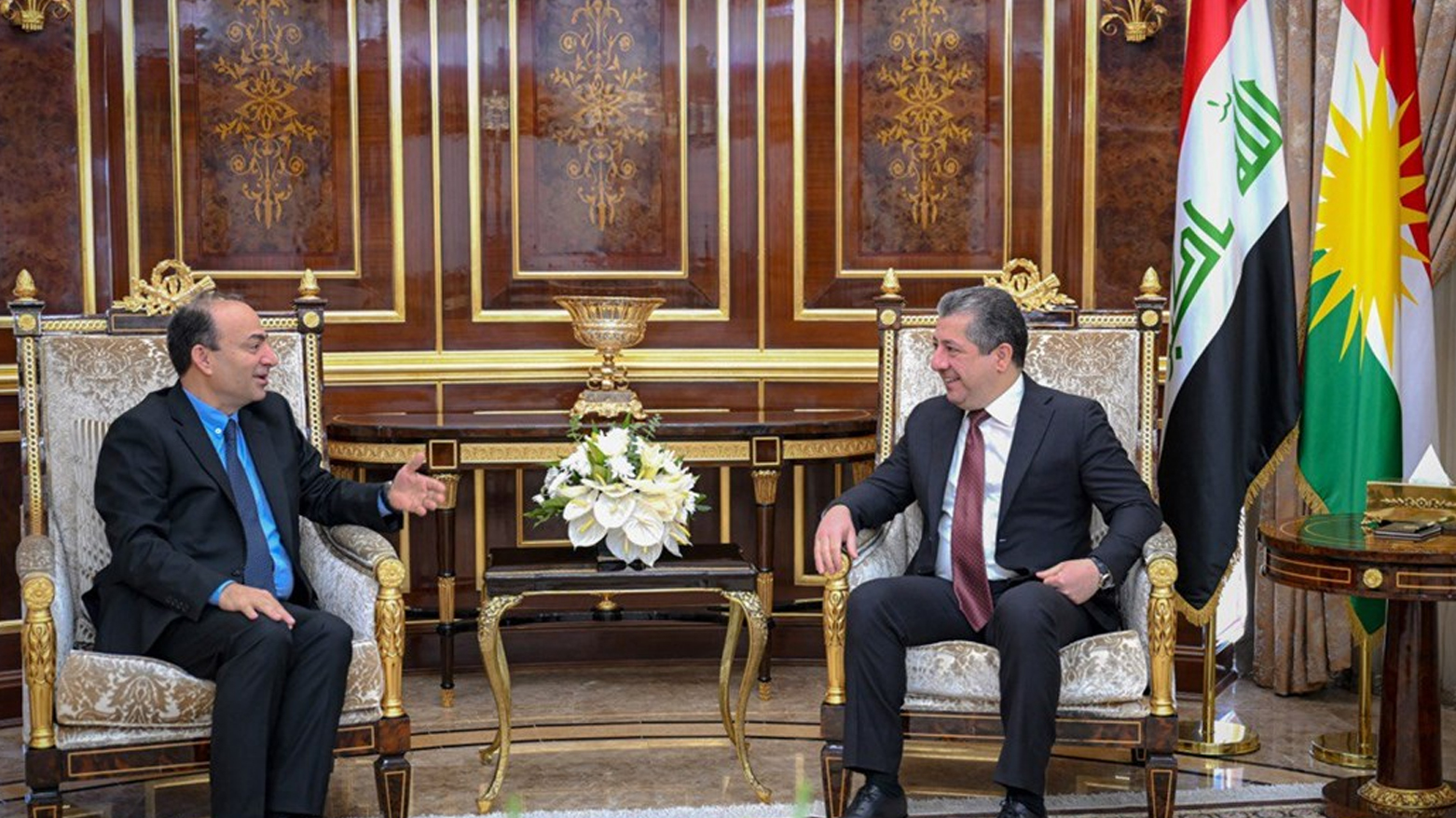PM Barzani, Osman Baydemir Discuss Critical Next Steps in Turkish Peace Process
PM Masrour Barzani and Kurdish politician Osman Baydemir met in Erbil to discuss the Turkish peace process, following the PKK's historic withdrawal of forces.

ERBIL (Kurdistan24) – The Kurdistan Region Prime Minister Masrour Barzani on Tuesday hosted Osman Baydemir, the prominent Kurdish politician and former member of the Turkish parliament, for a detailed discussion on the general situation in Kurdistan and the critical next steps in the rapidly evolving peace process in Türkiye.
The meeting, held in Erbil, underscores the Kurdistan Region's active and engaged role in supporting a peaceful resolution to the decades-long conflict and highlights the importance of dialogue and coordination among Kurdish leaders as they navigate this historic and hopeful, yet still delicate, new phase.
The discussion between Prime Minister Barzani and Baydemir comes at a moment of unprecedented opportunity, a time defined by a series of momentous and tangible steps toward de-escalation.
The current peace process was set in motion by a historic declaration from the Kurdistan Workers' Party (PKK), which, following a call from its imprisoned leader, Abdullah Öcalan, announced its organizational dissolution and a definitive end to its long and bloody armed struggle.
This was followed by the Kurdistan Communities Union's (KCK) recent and pivotal announcement that it had begun the withdrawal of all its armed forces from Turkish soil, a move that has transformed years of political rhetoric into concrete military action and has significantly raised hopes for a lasting and durable resolution to a conflict that has claimed tens of thousands of lives.
The meeting in Erbil provided a crucial platform for the two leaders to exchange views and assess the current state of this fragile process.
They reportedly discussed the broader situation in Kurdistan and the wider region, with a particular focus on the specific steps that are now needed to build upon the positive momentum and ensure that the opportunity for peace is not lost.
Osman Baydemir's presence in Erbil and his engagement with the Prime Minister are particularly noteworthy given his long and often difficult history as a leading advocate for Kurdish rights within the Turkish political system.
A former and widely respected mayor of Diyarbakır, the largest Kurdish-majority city in Türkiye, and a former member of the Turkish parliament, Baydemir's career has been defined by his unwavering commitment to a peaceful and democratic solution to the Kurdish issue.
His own political journey, however, serves as a stark reminder of the immense challenges and deep-seated issues of governance and rights that the current peace process must overcome.
His parliamentary career was abruptly cut short in 2018 when he was expelled from the Turkish Grand National Assembly following a controversial conviction for "insulting a government employee," a charge that stemmed from his criticism of the conduct of police officers.
In the politically charged atmosphere of the time, this conviction was widely seen by his supporters as a politically motivated attempt to silence a prominent Kurdish voice. Following his expulsion and facing the threat of further legal action, Baydemir went into exile and has since been living in London.
His background as a lawyer and a former chair of the Diyarbakır branch of the Human Rights Association further underscores his deep and personal connection to the fundamental issues of justice, rights, and the rule of law that lie at the heart of the conflict.
As a figure who has experienced both the potential of the Turkish political system and its punitive power, Baydemir's perspective on the current peace process is undoubtedly one of both cautious optimism and profound realism.
His meeting with Prime Minister Barzani, which comes a day after meeting with President Masoud Barzani, highlights the different paths the Kurdish struggle has taken in different parts of the region, and the importance of shared experience and strategic coordination in advancing the broader national cause.
The meeting coincides with a new round of discussions between the so-called “Imrali delegation” and imprisoned PKK leader Abdullah Öcalan, the results of which were released on Tuesday morning.
The statement detailed a profound and nuanced exchange that went beyond immediate political considerations, emphasizing the need to address the historical and sociological dimensions of the Kurdish question and calling for its resolution to be formally enshrined within Türkiye’s legal and constitutional framework.
Analysts and observers of the process widely agree that the ball is now firmly in the court of the Turkish government. The unilateral steps taken by the PKK and its affiliates—from the symbolic burning of weapons to the full-scale withdrawal of fighters—have created an unprecedented and largely pressure-free environment for Ankara to engage in meaningful political reform.
However, the process remains in a delicate and formative stage. While the Turkish government has welcomed the de-escalation and has engaged in high-level talks with the pro-Kurdish DEM Party, it has yet to publicly outline its own specific and reciprocal legal and constitutional reforms, which have been a long-standing demand of Kurdish political movements.
The success of this historic initiative is viewed as critical, not only for bringing an end to a conflict that has caused immense suffering and instability for nearly half a century but also for fundamentally reshaping Türkiye's domestic politics and its international relations.
A lasting peace would have profound implications for the country's democratic development, its economy, and its standing in the region and the world.
The meeting between Prime Minister Barzani and Osman Baydemir in Erbil is a clear and powerful signal that the leadership of the Kurdistan Region is fully engaged in this process, lending its support, experience, and diplomatic weight to the collective effort to turn this rare and precious opportunity for peace into a lasting reality.